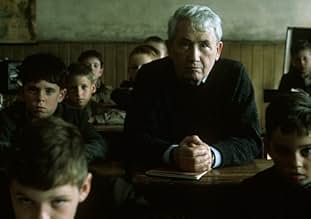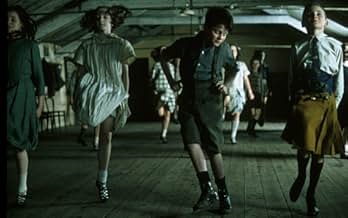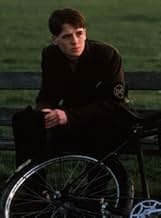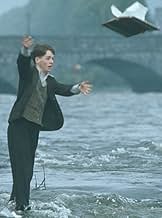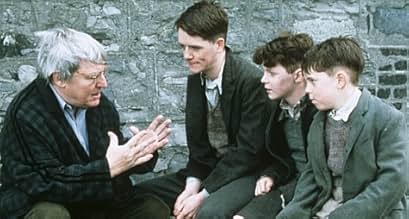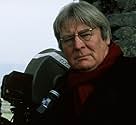Adicionar um enredo no seu idiomaAn Irish Catholic family returns to 1930s Limerick after a child's death in America. The unemployed I.R.A. veteran father struggles with poverty, prejudice and alcoholism as the family endur... Ler tudoAn Irish Catholic family returns to 1930s Limerick after a child's death in America. The unemployed I.R.A. veteran father struggles with poverty, prejudice and alcoholism as the family endures harsh slum conditions.An Irish Catholic family returns to 1930s Limerick after a child's death in America. The unemployed I.R.A. veteran father struggles with poverty, prejudice and alcoholism as the family endures harsh slum conditions.
- Direção
- Roteiristas
- Artistas
- Indicado a 1 Oscar
- 5 vitórias e 12 indicações no total
- Narrator
- (narração)
- Young Malachy
- (as Shane Murray Corcoran)
- Direção
- Roteiristas
- Elenco e equipe completos
- Produção, bilheteria e muito mais no IMDbPro
Avaliações em destaque
of Irish life.
But the 1930's in poor suburbs of New York in the Great Depression was hardly a friendly environment lurking behind the awesome sight of the lady with the torch in the harbour (a present of the French Government).
`Angela's Ashes' records those grim years for a poor family, based on hard autobiographical facts; but Frank McCourt's book better conveys that curiously Irish sense of fatalistic humour combined with that strangely abject Catholicism so pervasive in life of those times. The elements contrast and contradict themselves: the useless alcoholic father who must be respected because he is their father, though later he disappears, and the boy's (Frankie) obedient and supposedly devout sessions at the confessionary box, would seem to veer into mirth if it were not for the sinister underlying sociological aspects. And it is the classroom where much of this spoon-fed doctrinal interpretation obviates the ruthless imposition of supposedly `clean' ideology - whether Catholic or not.
Beautifully filmed in almost black and white, with more colour creeping in as the film progresses, undoubtedly Alan Parker has done a good job and has tried to remain faithful to the philosophical concepts of the book. Excellent Emily Watson and Robert Carlyle, but no less so the different youngsters used in the film as the children grew up, especially Michael Legge. Other secondary actors are all exemplary, well cast. The result is a film that has an authentic feel to it, such that having already read the book and seeing this film twice in no way diminishes the interest it suscitates. The music is a very different kind of John Williams to what we are accustomed, giving correct ambience to the story's unfolding.
But reading the book provides you with a little more background- more insight as to WHY the family is in the situation it is (the mother was "knocked up" and the two were forced into marriage and family life that probably NEITHER were ready for), and especially the impact of the death of the little baby girl had- most notable in the father.
All in all, it was a great film... seriously. It's the memories a poor Irish childhood- but the best part is that much of it is told through the eyes of a 'child' (even if its in retrospect). The reason that it is unique, I think, is that if the viewer is open enough, they can get beneath the obvious misery that we're pelted with and really see the innocence of a child through out the story.
I get really irritated with those that brush it off as "been there, done that", or "Woe is me, I was a poor Irish child." I think that shows ignorance and disgusting apathy- go watch a movie where stuff explodes to keep your feeble mind occupied, because you obviously are too shallow to understand what you're seeing. Imagine yourself as that child- in a nation full of families stuck in the same rut. This isn't some Hollywood drama concocted... this is(was) someone's LIFE. And the movie sticks very much to the book- I remembered many of the exact lines word for word from the text. Also... a few people have complained about the 'incomplete' ending. That's pretty much exactly where the book ends- read (horror of HORRORS!) the sequal, 'Tis, to find out the rest.
Either way- very touching film. Definitely dark and deep, and I recommend it to anyone who has an open mind.
Yet, the film is also, at times, rich in humor and a sense of that unquenchable optimism that somehow exists in even the most hopeless of circumstances. Frankie, despite the harsh conditions of his life, remains a boy focused on the good things that come his way, enduring even a loving but utterly irresponsible ne'er-do-well father (beautifully played by `The Full Monty's Robert Carlyle) with an indulgence and tolerance borne of filial devotion. As Frankie grows from young boy, dutifully fulfilling the parental role for his younger brothers, to a man verging on the edge of adulthood, he feeds on his dreams of moving to America to start a new life full of hope and promise. The people and situations he encounters on this road create a stunning tapestry of life, teeming with bitterness and coldness it is true, but also with occasional, albeit momentary, displays of warmth, kindness and compassion whether they be from a seemingly bitter aunt who, much to his astonishment, buys Frankie a brand new set of clothes in which to start his new job, a teacher who inspires him to see life beyond the circumscribed limits of this dreary Irish town or a compassionate priest who counsels Frankie in a moment of dark despair. These help to counterbalance the deadening effects of his father's thoughtlessness and drunkenness, the death of his first love by consumption, the often brutal treatment he receives at the hands of both his teachers and fellow classmates. And all the while there stands his mother, the anchor that holds him firmly in place, a woman beaten down by poverty, the untimely deaths of her children, the fecklessness of her otherwise loving husband - yet a woman so full of the quality of stoic self-sacrifice that it is from she that Frankie draws the strength he needs to move on in his life.
Emily Watson provides a luminous portrait of this woman, triumphantly conveying the longsuffering reserve that helps shield her from the ugliness and dreariness of her life and provides her with the strength to carry on and build into her children a sense of moral rectitude. And the three boys who portray Frankie at various stages of the drama are utterly perfect in their wide-eyed naturalism, as they look upon a world often incomprehensible in its drabness and cruelty.
It seems to be becoming a truism lately that, if you want to see the bleakest portrayal of life imaginable, go to see a film set in Ireland. Nowhere does the sun shine less frequently, nowhere do the drab colors of gray and brown so heavily predominate, nowhere does poverty seem so all encompassing and inescapable. The Ireland of `Angela's Ashes' is surely no exception. The filmmakers, moreover, cast a scathing eye on the mindless superstition, bigotry and hypocrisy to be found in much of the blindly pro-Southern Ireland, anti-Protestant, anti-British, anti-Northern Ireland attitude perpetuated by the Catholic Church there in the 1930's. Thus, in the depths of McCourt's autobiographical story, lies a diatribe with its roots planted deep in political and social protest. Yet, because of our fascination with the boy at the center of the narrative, these qualities filter through subtly, never dominating the proceedings. `Angela's Ashes' is rather, from beginning to end, a moving story about goodhearted, ordinary people learning to cope with the immense hardships life throws their way. In the long run, it certainly makes one happier with one's own lot in life. `Angela's Ashes,' for those who can take its uncompromising view of reality, is a richly rewarding experience.
Você sabia?
- CuriosidadesInterior church scenes were shot in a Dublin studio. Because of its controversial content, the production was denied permission to shoot in any Limerick churches.
- Erros de gravaçãoThe Statue of Liberty has a solid, gold-plated flame, installed in 1984.
- Citações
Narrator: [First lines] When I look back on my childhood, I wonder how my brothers and I managed to survive at all. It was, of course, a miserable childhood. The happy childhood is hardly worth telling. Worse than the ordinary miserable childhood is the miserable Irish childhood. And worse still is the miserable Irish Catholic childhood.
Principais escolhas
Detalhes
- Data de lançamento
- Países de origem
- Idiomas
- Também conhecido como
- Angela's Ashes
- Locações de filme
- Empresas de produção
- Consulte mais créditos da empresa na IMDbPro
Bilheteria
- Orçamento
- US$ 50.000.000 (estimativa)
- Faturamento bruto nos EUA e Canadá
- US$ 13.042.112
- Fim de semana de estreia nos EUA e Canadá
- US$ 54.628
- 26 de dez. de 1999
- Faturamento bruto mundial
- US$ 13.042.112
- Tempo de duração2 horas 25 minutos
- Cor
- Mixagem de som
- Proporção
- 1.85 : 1
Contribua para esta página




